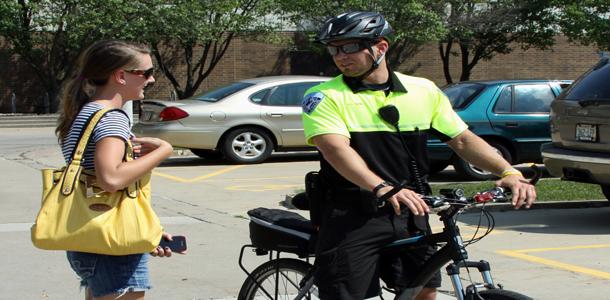Increased response time and no fuel costs are two major highlights of the new bike patrol program implemented at Madison College this year. Started during the summer semester, two Trek bikes operated by four officers now patrol the three largest Madison campuses.
“It was a project that I had instituted at a previous employer – which was a university setting – and it became very popular,” Chief of Public Safety, James Bottoni said. It worked so well there, that he felt it was something that would benefit Madison College.
“It gets the officers more involved,” Bottoni said.
The program provides a better interaction between the public safety officers and the students. It’s a more comfortable setting conversing without the barrier of the patrol car. The uniforms on the bike patrollers are a little more casual and inviting than the foot patrol ones, as well. Bottoni feels that it is a positive role model for the officers to be able to communicate with the students, one on one.
“Bikes become a magnet for the younger population and it will draw the younger student to them very similar to what horses do,” Bottoni said.
Making the students feel more comfortable is one of the main goals of the programs. The bike patrol program forces the officers out of the vehicles and makes them more approachable. It gives them a bit more exercise, as well.
“We can go places where cars can’t,” Bottoni said.
More maneuverability and shortcuts significantly increases response time when on the bikes. Bottoni estimates that the bikes provide an increase of 30-40 percent.
Another benefit to the college is the fact that it’s a green. There are no fuel costs for the bikes, and maintenance is minimal. Repairs might include a tube that pops or a cable that breaks so the costs stay low.
A downfall to the program is that it’s suitable only for warm weather. The bikes are out of operation from late October to about the middle of May.
During the times of operation, patrol car use is reduced by one, saving fuel and maintenance costs.
“There is a start-up cost to the program – the bikes. You have to buy good quality bikes,” Bottoni said.
A proposal was submitted to Trek Bicycle Corporation for a donation. After about six weeks they came through and donated the frames and all of the police upgrade equipment. There was a little delay in the response time. Many school districts and police departments had tightened their budgets, and were looking for donations as well.
Everything was shipped to the Trek store on the eastside of Madison. The store then donated all of the labor to put the bikes together, and offered a 50 percent discount on any additional equipment that the college wished to purchase. Some extra lighting and bags were added to the bikes at that discount.
“So, our start-up cost for equipment was minimal,” Bottoni said.
The donations amounted to about $3,000.
“If Trek didn’t come through, I would have held off, asked for the funding for this fiscal year – that we’re into right now – and then provided the bikes for summer of 2012,” Bottoni said.
No funds would have been taken from anywhere else in the college.
“That was one area that I was pretty firm about – that I wasn’t going to rob Peter to pay Paul,” Bottoni said.
The certified bike patrol officers are scheduled for 10-hour shifts with the bikes. Their job is to patrol the entire Truax campus and parking lots, the Commercial Avenue campus, and the downtown campus. The bikes are transported from campus to campus by the officers physically riding them, mostly on bike paths.
A plan is in place to add two more bikes for next year. It is already budgeted in, even without donations.
Should Trek come through again, the money will be used for something else in the department. Bottoni will be submitting a similar proposal to Trek for 2012.


























